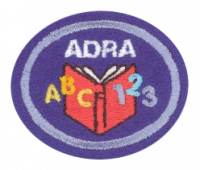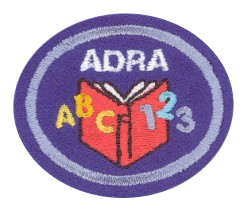Difference between revisions of "AY Honors/Literacy/Answer Key"
(Marked this version for translation) |
|||
| (29 intermediate revisions by 6 users not shown) | |||
| Line 1: | Line 1: | ||
| − | {{ | + | {{HonorSubpage}} |
| + | <!--{{Honor_Master|honor=Literacy|master=ADRA}}--> | ||
| + | {{alt honor|whence=outside|domain=North American Division|altpage=Adventist Youth Honors Answer Book/Outreach/Tutoring|altname=Tutoring}} | ||
| + | <section begin="Body" /> | ||
| + | {{ansreq|page={{#titleparts:{{PAGENAME}}|2|1}}|num=1}} | ||
| + | <noinclude><translate><!--T:21--> | ||
| + | </noinclude> | ||
| + | <!-- 1. Define the term literacy. --> | ||
| − | = | + | <!--T:22--> |
| − | + | <noinclude></translate></noinclude> | |
| + | {{CloseReq}} <!-- 1 --> | ||
| + | {{ansreq|page={{#titleparts:{{PAGENAME}}|2|1}}|num=2}} | ||
| + | <noinclude><translate><!--T:23--> | ||
| + | </noinclude> | ||
| + | <!-- 2. Research and briefly describe how two or three organizations in your community or country promote literacy or provide literacy services to children and adults. --> | ||
| − | == | + | ===In-school, cross-age tutoring=== <!--T:4--> |
| − | + | In school programs are managed in a variety of ways. One common way is cross-age tutoring. In this case students, normally of a higher grade level, tutor other students in the areas where they need assistance. There are many advantages of this type of one on one peer tutoring: often the tutor has recently completed the same classes having a perspective on the unique issue a particular class presents, camaraderie can be formed quickly which often promotes the tutored to relax and lower their guard creating a better learning environment. Cross-age tutoring offers the tutor the opportunity to develop social skills and management skills not often developed in the school years of youth, giving the tutor an added benefit as well. | |
| − | |||
| − | + | ===After-school or weekend program=== <!--T:5--> | |
| + | This type of tutoring program is perhaps the most common. They are often organized by church-related groups or community organizations. These programs meet once or twice per week and make use of volunteer tutors. | ||
| − | + | ===Community homework center=== <!--T:6--> | |
| + | Community homework centers are not common to most areas. These centers often operate in the inner city of metropolitan areas as a haven for students who would otherwise be distracted by the environment around them. Centers such as these are normally not-for-profit corporations that are open to all youth seeking a place of refuge to study and socialize, their continuance is dependent upon the generosity of the community and the dedication of what is often one or two full-time staff members. Peer tutoring and assistance from staff are available at these locations, and the staff often fill a parent-like role for students who are often neglected at home. In addition to a safe a proper place for study, such centers usually offer some recreation and community service opportunities to the youth who use them. These non-study activities help to develop social skills and skills in cooperation, self control, and problem solving as well as provide a special sense of accomplishment to youth who otherwise have no purpose in there lives. | ||
| − | + | <!--T:24--> | |
| + | <noinclude></translate></noinclude> | ||
| + | {{CloseReq}} <!-- 2 --> | ||
| + | {{ansreq|page={{#titleparts:{{PAGENAME}}|2|1}}|num=3}} | ||
| + | <noinclude><translate><!--T:25--> | ||
| + | </noinclude> | ||
| + | <!-- 3. Write a paragraph explaining why literacy is important. --> | ||
| − | + | <!--T:26--> | |
| + | <noinclude></translate></noinclude> | ||
| + | {{CloseReq}} <!-- 3 --> | ||
| + | {{ansreq|page={{#titleparts:{{PAGENAME}}|2|1}}|num=4}} | ||
| + | <noinclude><translate><!--T:27--> | ||
| + | </noinclude> | ||
| + | <!-- 4. Complete three of the following activities: --> | ||
| − | + | <!--T:28--> | |
| + | <noinclude></translate></noinclude> | ||
| + | {{ansreq|page={{#titleparts:{{PAGENAME}}|2|1}}|num=4a}} <!--T:9--> | ||
| + | <noinclude><translate><!--T:29--> | ||
| + | </noinclude> | ||
| − | + | <!--T:30--> | |
| − | == | + | <noinclude></translate></noinclude> |
| − | + | {{CloseReq}} <!-- 4a --> | |
| + | {{ansreq|page={{#titleparts:{{PAGENAME}}|2|1}}|num=4b}} <!--T:10--> | ||
| + | <noinclude><translate><!--T:31--> | ||
| + | </noinclude> | ||
| − | == | + | <!--T:32--> |
| − | + | <noinclude></translate></noinclude> | |
| + | {{CloseReq}} <!-- 4b --> | ||
| + | {{ansreq|page={{#titleparts:{{PAGENAME}}|2|1}}|num=4c}} <!--T:11--> | ||
| + | <noinclude><translate><!--T:33--> | ||
| + | </noinclude> | ||
| − | == | + | <!--T:34--> |
| − | + | <noinclude></translate></noinclude> | |
| + | {{CloseReq}} <!-- 4c --> | ||
| + | {{ansreq|page={{#titleparts:{{PAGENAME}}|2|1}}|num=4d}} <!--T:12--> | ||
| + | <noinclude><translate><!--T:35--> | ||
| + | </noinclude> | ||
| − | == | + | <!--T:36--> |
| − | + | <noinclude></translate></noinclude> | |
| + | {{CloseReq}} <!-- 4d --> | ||
| + | {{ansreq|page={{#titleparts:{{PAGENAME}}|2|1}}|num=4e}} <!--T:13--> | ||
| + | <noinclude><translate><!--T:37--> | ||
| + | </noinclude> | ||
| − | + | <!--T:38--> | |
| + | <noinclude></translate></noinclude> | ||
| + | {{CloseReq}} <!-- 4e --> | ||
| + | {{CloseReq}} <!-- 4 --> | ||
| + | {{ansreq|page={{#titleparts:{{PAGENAME}}|2|1}}|num=5}} | ||
| + | <noinclude><translate><!--T:39--> | ||
| + | </noinclude> | ||
| + | <!-- 5. Choose three words and explain to your instructor how you would teach someone what the words mean and how to spell them. --> | ||
| − | == | + | <!--T:40--> |
| − | + | <noinclude></translate></noinclude> | |
| + | {{CloseReq}} <!-- 5 --> | ||
| + | <noinclude><translate></noinclude> | ||
| + | ==Historical Note== <!--T:15--> | ||
| − | + | <!--T:16--> | |
| + | This honor was previously called Tutoring but renamed in 2009. | ||
| − | + | ==References== <!--T:17--> | |
| + | <noinclude></translate></noinclude> | ||
| − | + | [[Category:AY Honors/noindex{{GetLangSuffix}}|{{SUBPAGENAME}}]] | |
| + | <section end="Body" /> | ||
| − | + | {{CloseHonorPage}} | |
| − | |||
| − | |||
| − | |||
| − | |||
| − | |||
| − | |||
| − | |||
| − | |||
| − | |||
| − | |||
| − | |||
| − | |||
| − | |||
| − | |||
| − | |||
| − | |||
| − | |||
| − | |||
| − | |||
| − | |||
| − | |||
| − | |||
| − | |||
| − | |||
| − | |||
Latest revision as of 14:51, 4 October 2021
| This honor is available only to clubs outside the North American Division. For those inside the North American Division, use the Tutoring honor instead. |
1
2
In-school, cross-age tutoring
In school programs are managed in a variety of ways. One common way is cross-age tutoring. In this case students, normally of a higher grade level, tutor other students in the areas where they need assistance. There are many advantages of this type of one on one peer tutoring: often the tutor has recently completed the same classes having a perspective on the unique issue a particular class presents, camaraderie can be formed quickly which often promotes the tutored to relax and lower their guard creating a better learning environment. Cross-age tutoring offers the tutor the opportunity to develop social skills and management skills not often developed in the school years of youth, giving the tutor an added benefit as well.
After-school or weekend program
This type of tutoring program is perhaps the most common. They are often organized by church-related groups or community organizations. These programs meet once or twice per week and make use of volunteer tutors.
Community homework center
Community homework centers are not common to most areas. These centers often operate in the inner city of metropolitan areas as a haven for students who would otherwise be distracted by the environment around them. Centers such as these are normally not-for-profit corporations that are open to all youth seeking a place of refuge to study and socialize, their continuance is dependent upon the generosity of the community and the dedication of what is often one or two full-time staff members. Peer tutoring and assistance from staff are available at these locations, and the staff often fill a parent-like role for students who are often neglected at home. In addition to a safe a proper place for study, such centers usually offer some recreation and community service opportunities to the youth who use them. These non-study activities help to develop social skills and skills in cooperation, self control, and problem solving as well as provide a special sense of accomplishment to youth who otherwise have no purpose in there lives.
3
4
4a
4b
4c
4d
4e
5
Historical Note
This honor was previously called Tutoring but renamed in 2009.
References



